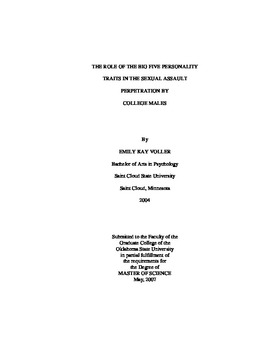| dc.description.abstract | The purpose of this study was to investigate the overall personality constellation of perpetrators of sexual aggression using the Five-Factor model. The aim was to examine whether variation in the Big Five personality traits in a college population provides any insight into the nature of sexual assault and rape perpetrators. Participants were 521 men recruited from a research participant pool at Oklahoma State University. Each participant completed the Life Experiences Questionnaire, the NEO-Personality Inventory Revised (NEO-PI-R), and an expanded version of the Sexual Experiences Survey (MSES-P). Men were classified based on their responses to the SES-P as having perpetrated rape or not, as well as having perpetrated sexual assault (including rape) or not. Multivariate and univariate analyses of variance were used to test the hypothesis that perpetrators would report different personality profiles than nonperpetrators. Both sexual assault and rape perpetrators reported greater levels of Neuroticism, and lower levels of Openness and Conscientiousness when compared to nonperpetrators (all p < .05). Rape perpetrators had lower levels of Extraversion and Agreeableness when compared to nonperpetrators (both p < .01). Consistent with hypotheses, both rape and sexual assault perpetrators had lower scores on straightforwardness (p < .05). Also consistent with hypotheses, rape perpetrators scored lower on tender-mindedness when compared to nonperpetrators (p = .03). Contrary to expectation, sexual assault and rape perpetrators had significantly lower scores on excitement-seeking (p < .05). In addition, both perpetrator groups scored higher on vulnerability, and lower on warmth, feelings, ideas, altruism, competence, and dutifulness (all p < .05). Interestingly, sexual assault perpetrators scored higher on depression when compared to nonperpetrators (p = .004), and rape perpetrators scored lower on positive emotions, trust, and deliberation (all p < . 05). Results suggest that individuals who perpetrate sexual offenses differ from nonperpetrators on the Big Five dimensions of personality as measured by the NEO-PI-R. Thus, examining overall personality profiles may be useful in distinguishing perpetrators of sexual aggression from nonperpetrators. | |
